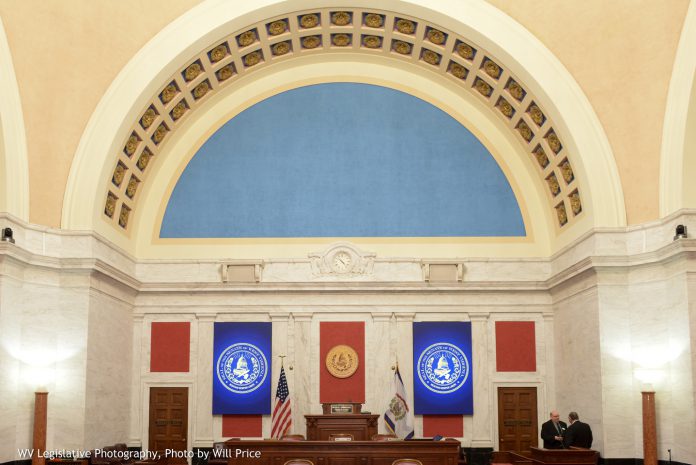As of 4 p.m. Friday, January 25, 2019, the 17th day of the first regular session of the 84th Legislature, 439 bills have been introduced to the senate. Of those bills, 22 have passed and have been sent on to the House for further consideration.
SB 1: This bill would require the establishment of Advanced Career Education (ACE) programs and creates the WV Invests Grant Program, both of which are for the purpose of increasing access to career education and workforce training.
SB 3: The bill would establish the WV Small Wireless Facilities Deployment Act. The bill would establish a process for wireless providers to access public rights-of-way:
- Cities may implement design guidance to compensate for historical areas and deal with problems such as unsightliness.
- These guidelines may not be discriminatory and must be reasonable.
- Sets right-of-way access annual rent per pole at $25.00
- Establishes a permitting process to be implemented by a municipality;
- Establishes attachment procedures for utility poles;
- Sets the annual rent at $30.00 per;
- Establishes application fees of $200 each for the first 5 poles, then $100 each thereafter;
- Every five years the fee may be adjusted upwards by 10% rounded to the nearest 5 dollars.
SB 17: Current law requires that persons convicted of certain listed sexual offenses must undergo “physical, mental and psychiatric” examinations to be eligible for consideration for probation. This bill would allow a psychological exam in lieu of a psychiatric exam.
SB 18: This bill would remove the requirement that a person must have a valid concealed handgun license to lawfully keep a firearm in their vehicle on the Capitol grounds. The Committee Substitute states that a person who may otherwise lawfully possess a firearm may keep a firearm in his or her vehicle if locked and out of view.
SB 61: This bill would add to the current listed offenses for which interception of communications (commonly referred to as “wiretapping”) may be authorized by a Court. The offenses being added would be first and second degree murder, first degree robbery, treason and participation in an organized criminal enterprise.
SB 62: The bill would require participation in drug court program before discharge of certain first-time drug offenses. People charged with simple possession of an opioid or opiate controlled substances would be required to undergo evaluation for enrollment in a drug court program or drug treatment program. If one successfully completes the drug court or drug treatment, the charges could be expunged.
SB 152: The bill would authorize the judicial expungement of certain misdemeanors and non-violent felonies from a person’s criminal record. The bill would allow a person to petition for expungement for the allowable misdemeanors one year after completion of incarceration or any period of supervision, whichever is later. A petition to expunge a felony may be filed three years after incarceration or the end of supervision, whichever is later.
>SB 191: This statute would authorize the Commissioner of Agriculture to modify §61 CSR 1 et seq. relating animal disease control. This rule would add new definitions to “feral swine” and “immediate slaughter.” It would also add a rule prohibiting the transportation of feral swine.
SB 223: The bill includes eight bills relating to Bureau of Commerce The proposed bills include:
SB 240: The bill would repeal certain legislative codes that are obsolete or are no longer authorized. The codes that would be repealed would have no impact to citizens of the state.
SB 253: The bill would end the practice of ongoing charging of consumer credit or debit cards or third-party payment accounts without the consumer’s express consent for ongoing shipments of a product or ongoing deliveries of services. The bill would require that businesses provide clear and conspicuous disclosures relating to automatic renewal offers or continuous service offers.
SB 255: This bill would reconstitute the Emergency Medical Services Advisory Council to include three more members, which include “three persons from the general public who are voting members.” The bill would also re-format some provisions and clarifies the appointment of other members.
This bill passed last session but was vetoed by the Governor.
SB354: This is a supplemental appropriation requested by the State Auditor’s Office. The supplemental would expire $1.5 million dollars from the Auditor’s Offices’ Securities Regulation fund and appropriate them to the Auditor’s Office Chief Inspector’s Fund.

